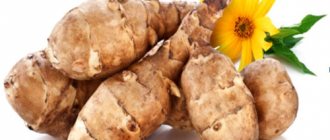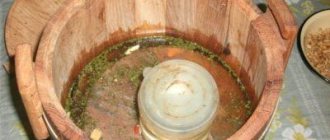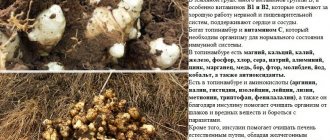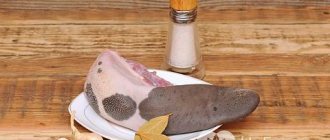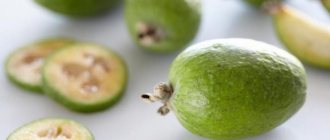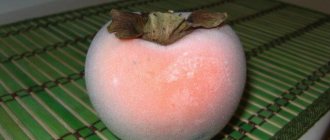Jerusalem artichoke is an unusual root vegetable that is used as food and contains many useful substances. In particular, these are vitamins, microelements and much more. It is impossible to overestimate the benefits of using Jerusalem artichoke. It is worth adding that the amino acids this root vegetable contains are priceless, because eight of them are not produced by the human body.
Jerusalem artichoke fruits are dug up after the first frost (from November to December). And the ground part of the plant (flowers, stems and leaves) is harvested in mid-summer. But, in most cases, it is recommended to dig up tubers in the spring, since then the maximum concentration of vitamins is observed. But this is still decided by the gardener to the best of his abilities and preferences. Jerusalem artichoke root crops are not stored for long, because long-term storage reduces the concentration of nutrients in the fruit.
You can use Jerusalem artichoke peeled or with the skin. If you cook food with this root vegetable in its peel, you will get a rather unattractive appearance of the dish. After all, shabby, unpeeled Jerusalem artichoke has a grayish color.
To properly clean Jerusalem artichokes, you need to consider the following tips:
• the knife should be used to move “towards you”; • you need to choose a knife that is sharp and comfortable for you; • medium-sized root vegetables are the easiest to clean.
To properly clean Jerusalem artichoke, you must first wash it thoroughly. Take a knife in your right hand and a tuber in your left. It is recommended to place the knife blade at a slight angle to the root crop. This way, less skin will be peeled off and more nutrients will remain. We press the thumb of the right hand to the fruit, and with the index finger we move the knife towards the thumb, which we constantly move away.
It's good if you have a special potato knife. They work easier and the peel is cut thinner. It’s also impossible to cut yourself with a potato knife.
A wooden, bone or stainless steel knife is better suited for cleaning Jerusalem artichoke. Before use, peeled tubers should be kept in cold water.
To prevent grated Jerusalem artichoke from darkening, you need to hold it in acidified water for several minutes and then strain. Another way to preserve the color of the grated mass is to sprinkle it with lemon juice.
Although peeled Jerusalem artichoke has a light color, during the cleaning process it loses a lot of iron and silicon, which are contained in the skin of this root crop and immediately underneath it.
Jerusalem artichoke peel contains important microelements and also protects the inside from oxidation. Therefore, you don’t have to clean it, but just wash it well with a brush and use it entirely without cleaning. And although Jerusalem artichoke is not related to potatoes, it is better to boil or bake it unpeeled, just like potatoes. I did this: if I make a salad from fresh Jerusalem artichoke for myself, then I grate it unpeeled, and if for guests, then I peel it, so the salad looks more aesthetically pleasing.
Quite, but only if you are able to wash it from traces of soil - there can be damage from pests where the soil gets in and sticks tightly. To be on the safe side, you can wipe the tubers with fine sandpaper. Then, you need to leave it in a saline solution for disinfection for half an hour. Make a solution where a teaspoon (small heaped teaspoon) of salt will be consumed per glass of water. Why such precautions? It is not known where the purchased Jerusalem artichoke was grown and what it was fed with - perhaps “manure” from the garden toilet. There is a possibility of eating worm eggs along with Jerusalem artichoke. But, this precaution is only if you use it in salads, and if you cook it, then no problems are foreseen.
Treatment and prevention of diseases. Conversation with a doctor. Food is medicine.
Recent comments
- Shop nón đẹp on Althaea officinalis
- Anonymous to the entry Bell
- Max on Pears and Apples
- Julianna on Spring fatigue
- admin to post Cirrhosis of the liver
Categories
- Children's health (8)
- Food-medicine (225)
- Health Element (3)
- There is a problem (157)
- Women's health (43)
- Beauty and health (49)
- Medicinal plants (409)
Characteristics and properties of Jerusalem artichoke
The official name of the earthen pear in botany is “Tuberous sunflower”
. The plant belongs to the Asteraceae family and represents the genus of sunflowers. The ground part is represented by a bright yellow inflorescence, very similar to the common sunflower. The edible part is a root vegetable, very similar in appearance to ginger tubers. It tastes like a cross between a Chinese pear and a potato. The plant is perennial, unpretentious, and reproduces by dividing the rhizomes (by tubers). In total, there are about three hundred species of this plant in nature.
Useful properties of Jerusalem artichoke
What is so interesting about the earthen pear? The taste of the root vegetable is very ordinary, it does not have an exquisite taste, it tastes like a slightly sweetish raw potato, but the beneficial properties of Jerusalem artichoke are literally amazing!
Jerusalem artichoke root crops have an impressive list of beneficial properties:
- has a positive effect on digestion;
- restores and improves the functioning of the endocrine glands;
- promotes weight correction in cases of obesity and uncontrolled weight gain;
- increases the resistance of the immune system;
- stabilizes the hematopoietic system, improves blood circulation;
- improves the condition of tissues, strengthens the walls of blood vessels;
- strengthens joints.
This is not a complete list of the advantages of this plant, which is very simple in appearance and taste; besides, Jerusalem artichoke root crops are widely used in cooking.
Short
How to cook Jerusalem artichoke
Many people do not know how to cook Jerusalem artichoke correctly. Tubers should be thoroughly washed and cleaned before use. This plant can be eaten raw or cooked.
Jerusalem artichoke flowers are used for brewing tinctures and medicinal teas, leaves for salads, and root vegetables for preparing all kinds of dishes.
The product can be subjected to almost all types of culinary processing: boiling in water and milk, frying, stewing, baking, drying and fermenting. Existing recipes for Jerusalem artichoke dishes allow you to prepare healthy dietary food from it for daily use.
Helpful and unpretentious
Jerusalem artichoke grows on any soil, rarely gets sick, and pests avoid it. Yes, you don’t need to take care of it at all!
Its tubers have a full range of beneficial properties characteristic of plant foods. That is, they are rich in ballast substances, nourish us with vitamins, and promote healthy digestion. However, there is also some cunning substance present in the tubers, which makes the earthen pear a unique product.
- Inulin is especially useful for those who either suffer from diabetes or are at risk for this disease. Regular consumption of Jerusalem artichoke helps the body regulate blood sugar levels. Ideally, diabetics should eat 2-3 tubers three times a day, 10 minutes before meals.
- But diabetes is just the tip of the iceberg. The substance helps remove any toxins from the body. The worse the environmental conditions, the more benefits Jerusalem artichoke with its healing inulin will bring.
- It also stops vomiting and relieves nausea, including in pregnant women.
- And very good for the heart.
It would seem like a wonderful plant, almost ideal! But why then is Jerusalem artichoke so rare in our summer cottages?
One of the reasons for this is the difficulty in preparing it. Polish turnips are similar to potatoes, but sweet. And where is she like that?
Benefits and harms
Medicinal properties
Treatment of diabetes mellitus with Jerusalem artichoke is based on the action of inulin. It lowers blood glucose levels, which alleviates symptoms:
- the urge to urinate becomes less frequent;
- thirst decreases;
- weakness and lethargy are replaced by vigor and increased performance;
- hunger becomes manageable;
- weight is normalized, and in both directions: if there was a shortage, weight gain occurs; if excess - weight loss;
- dryness of the skin and mucous membranes is eliminated;
- muscle weakness and spasms gradually go away;
- the risk of vision problems, which are usually diagnosed during a long course of the disease, is reduced.
Jerusalem artichoke bush
Experts note that Jerusalem artichoke is highly effective as an adjuvant in the treatment of not only diabetes, but also metabolic syndrome.
Beneficial features
Diabetes mellitus is a disease that is accompanied by various ailments and pathologies, since a lack of insulin and an excess of sugar in the blood disrupt the functioning of many organs. Therefore, it would be useful for people suffering from it to find out what else Jerusalem artichoke is good for in terms of health and what problems it can solve along the way:
- cleanses the body of toxins;
- reduces the level of bad cholesterol;
- breaks down fats, promoting weight loss and being one of the best dietary products (61 kcal per 100 g, GI = 15 units);
- improves digestion, restoring the natural microbiocenosis of the gastrointestinal tract;
- promotes better absorption of vitamins;
- strengthens the immune system;
- has antitumor, diuretic, laxative, vasodilating properties;
- helps improve well-being with tachycardia, anemia, varicose veins, ulcers, dysbacteriosis, gout, neurosis, dermatosis, osteochondrosis.
Ground pear is good for health, not only because of inulin. It also has a high silicon content, which:
- improves brain activity, in particular has a positive effect on the pituitary gland;
- normalizes the functioning of the thyroid gland;
- reduces the risk of heart disease;
- Helps the kidneys function without problems.
It is believed that the uniqueness of this plant is also in the fact that its roots are able to filter the substances that they absorb from the soil. This means that, no matter in what ecologically unfavorable area it grows, pesticides, radionuclides, nitrates, and heavy metal salts that poison the earth are not found in its parts.
Some sources dispute this point of view and put forward the exact opposite: the earthen pear is a plant filter that absorbs a maximum of toxins. However, even if this is so, you should not be afraid of this: inulin has the property of binding toxic substances, and in this form they are not at all dangerous to the body.
What's the harm?
People suffering from diabetes should be aware of the possible harm of Jerusalem artichoke if consumed regularly. This is especially important for them, since any deviation in health is fraught with serious problems.
Firstly, it causes increased gas formation. You need to be prepared for this. Secondly, it can enhance already poor blood clotting. Thirdly, it often causes stones in the body to move. This is fraught not only with severe pain, blockage of ducts and canals, but also with their rupture, which can be fatal.
About the name. The vegetable got its name from the province of the same name (the Tupinamba tribe lived on its territory) in North America, which is considered the birthplace of this cultivated plant.
Tips for beginners
- If you doubt whether you will like Jerusalem artichoke, plant it somewhere in a corner or in a small bed. There are cases when it was renewed without permission for many years in the same place, and it was necessary to fight the tenacious “sunflower” like a weed. If you try it, you will increase the plot.
- At the same time, Jerusalem artichoke is insidiously far from the familiar wheatgrass. Even being a “weed,” it is unlikely to prevent you from cultivating your favorite plot. So let this plant into your garden.
- Jerusalem artichoke grass (and it has a large green mass) is an excellent remedy for treating sore joints. Lightly crush, brew with boiling water, let stand and do foot, hand, or even full baths - according to indications.
Jerusalem artichoke: contraindications
It is important to note that, in addition to its benefits, in rare cases, earthen pear can cause harm to the body. But this is only when contraindications were ignored. So, eating this root vegetable is contraindicated:
- For allergy sufferers in case of individual intolerance to the components that saturate the fetus;
- For hypotensive patients: the root vegetable has a pronounced hypotensive ability;
- People suffering from type 1 diabetes mellitus without proper correction of blood glucose with the help of insulin preparations should not eat Jerusalem artichoke, since the fruit contains sucrose and starch.
If you have any chronic diseases that require a special diet, you should consult with a specialist about the possibility of including Jerusalem artichoke in your diet.
Clean or just wash?
The most insidious question when you are about to cook Jerusalem artichoke : do you need to peel it? Obviously, it needs to be washed, he was “sitting” in the ground. But should the thin skin be removed from the tubers? And what is the best way to do this?
- On the one hand, by removing the skin, we are deprived of substances needed by the body. Right underneath it, and in the skin itself, there is a lot of useful iron and silicon. And even if you use a special potato knife that removes only thin chips, you still won’t be able to preserve them 100%.
- On the other hand, the peel of Jerusalem artichoke clearly does not add beauty. And if the boiled tuber still looks acceptable, after all, we are eating jacket potatoes! - that grated Jerusalem artichoke with peel is creepy. Even washed until it’s squeaky clean, it will still look like a gray paste that looks dirty and therefore not aesthetically pleasing.
- Probably the best solution is a compromise. You can cook Jerusalem artichoke or cut it for frying with the skin on. And if the recipe involves a grater, choose what is your priority today. Serving to guests and want everything to be perfect? Cleanse. Have you decided to eat a healthy salad alone? Try it unrefined.
Attention!
- Jerusalem artichoke is useful fresh: heat treatment destroys some of the vitamins and other necessary substances.
- Excessive consumption of Jerusalem artichoke can cause flatulence (gas).
How to use
For Jerusalem artichoke to be as useful as possible, you need to know how to use it correctly.
In any form
- Pills
You can purchase dietary supplements based on inulin, obtained from Jerusalem artichoke tubers, and use them according to the instructions. The best: Neovitel, Longevity, Santerella, Topinat, Topinex. Some drugs are called: “Inulin from Jerusalem artichoke” or simply “Jerusalem artichoke”. Ask the pharmacy, they will probably advise you something.
Dietary supplements based on inulin
The dosages for each dietary supplement are different (from 1 to 4 capsules per day), as are the treatment periods (from 2 weeks to 2 months).
- Syrup
You can also buy Jerusalem artichoke syrup there or in the diet food department. It can be 100% natural or with additives (lingonberries, cherries, raspberries, etc.). It should be drunk half an hour before meals, 150 ml. Can be diluted with water in any proportions. The course of treatment is 2 weeks. Repeat in a month.
- Tubers
You can eat it in any form: raw and thermally processed. But in the first case, you need to take into account possible side effects (digestive disorders). Tubers are poorly stored, quickly mold and rot, so dried Jerusalem artichoke can save you in winter. Root vegetables are cut into thin slices, dried in the oven and packaged in glass jars or paper bags. In this form, they can be added to soup, made into decoctions and infusions, and eaten as dried fruits.
- Leaves
They do not contain as much inulin as tubers, but they can also be used. They are usually brewed to make a healing drink. They are also dried.
Daily norm
Diabetic nutrition for diabetes mellitus forces people not only to carefully choose products for their menu, but also to calculate their daily intake that is safe for health. This also applies to Jerusalem artichoke, despite all its medicinal properties.
Capsules, tablets, syrup - dosages are prescribed in the instructions.
Fresh tubers - no more than 150 g per day. Heat-treated (boiled, baked, stewed, fried) - 300 g. Dried - 200 g.
Drinks (juice, syrup, decoction, infusion) - no more than 2 glasses per day.
When is the best time to eat
Jerusalem artichoke can be eaten at any meal. But it’s even better to keep slices from its tubers or drinks based on it somewhere nearby. As soon as you feel a jump in blood sugar, you should consume them - and after half an hour the condition will return to normal (this product is characterized by rapid digestion and absorption).
Jerusalem artichoke tubers
Product Compatibility
Pairs well with:
- any other vegetables
- vegetable oils;
- pulses;
- nuts;
- dairy products;
- bread, cereals.
Not compatible with:
- meat, fish, seafood;
- sweets, confectionery;
- fruits;
- eggs.
Take this information into account when creating a dietary menu.
Additional recommendations
To ensure that the use of Jerusalem artichoke for diabetes brings only benefits, take on board a few more tips on how to use it correctly.
- The tubers are thoroughly washed in water.
- The ends and damaged areas are cut off.
- The skin is too thin and contains useful substances, so the tubers cannot be peeled.
- If you decide to give a vegetable to a child suffering from diabetes, you must first consult with your doctor about the possibility of such auxiliary therapy.
- After 2 weeks of active use, take a 2-week break and replace it with another inulin-containing product.
- The tubers are stored in the refrigerator in a paper bag for a month.
This is interesting. In Russia, for a long time, Jerusalem artichoke was grown and used only as a medicinal plant, and not for food purposes.
Not just for the stomach
Some gardeners grow Jerusalem artichokes as a shade curtain. This is when you need to hide the neighboring bed from the scorching rays of the hot summer sun. Adult plants exceed 1 m in height, so there is enough shade from them.
And, of course, it is worth remembering the decorative properties of the inflorescences, similar to small sunflowers.
- The dug up Jerusalem artichoke is stored very poorly. It is better to eat it immediately, or at most, after two or three days.
- By placing the tubers in the refrigerator in a paper bag, you can keep it there for a week or longer. But it’s better to eat it before your next weekly visit to the dacha.
- The tuber will, of course, remain edible longer, but if it is already flabby, then it has clearly lost some of its benefits. How then to deal with the blanks?
- The easiest way is to leave part of the Jerusalem artichoke directly in the soil for the winter. In early spring you can dig it up and eat it. It is at this time that we really need any vitamins we can get.
- The taste of Jerusalem artichoke tubers is quite specific.
- If you don’t like it, don’t rush to throw it in the compost; there are other ways to use Jerusalem artichoke.
- For example, for a rejuvenating mask. Grate the tuber or pass through a meat grinder, and then apply the resulting pulp to your washed face. Keep it on for 20 minutes, then rinse with warm water. Use this mask once every three days. It is believed that the course should include at least ten procedures. But, most likely, you will feel and see positive changes much earlier.
Jerusalem artichoke recipes
Recipes for making Jerusalem artichoke are quite numerous and varied. It is used to prepare casseroles, pancakes and various salads.
Jerusalem artichoke salad. Recipe
- Clean peeled Jerusalem artichoke tubers are crushed on a coarse grater.
- Finely chopped greens and green onions are added to it. Instead of onion feathers, you can use onions, chopped into half rings or rings.
- The salad is seasoned with mayonnaise, sour cream or vegetable oil, and salt.
Autumn salad.
- Peeled Jerusalem artichoke tubers should be grated (preferably coarse).
- To it you need to add sauerkraut and chopped apples.
- The ratio of Jerusalem artichoke, cabbage and apples should be 2:2:1.
- The resulting mixture is seasoned with vegetable oil, salt, chopped green onions and herbs.
Jerusalem artichoke salad with radish.
- Radishes and Jerusalem artichokes should be washed and peeled.
- Next, the root vegetable tubers are grated.
- Add green onions and finely chopped greens to them.
- The salad should be salted and seasoned with sour cream.
In the same way, you can prepare a salad with Jerusalem artichoke and radish.
Jerusalem artichoke salad with egg.
- Jerusalem artichoke tubers are grated.
- Add hard-boiled finely chopped eggs, finely chopped herbs and onion feathers.
- The salad is seasoned with sour cream or mayonnaise and a small amount of salt.
Jerusalem artichoke salad with carrots.
- Root tubers and carrots should be grated.
- Add onion feathers and finely chopped greens to the ingredients.
- This salad can be seasoned with any dressing (mayonnaise, sour cream or some salad sauce) and salt to taste.
- If desired, you can add a little pickled cucumber to the salad, and any type of vegetable oil should be used as a dressing.
What do you know about the benefits and harms of arugula? The plant is popular among those who want to lose weight.
Here is about the beneficial properties of fenugreek.
About the properties of lentils at: //budu-zdorov.net/produkty-i-zdorovje/poleznye-produkty/chechevitsa-polza-i-vred.html
Tasty!
- Jerusalem artichokes can be prepared in many different ways. If it is inferior to potatoes in its versatility, it is not by much. Jerusalem artichoke can be fried, stewed, baked, boiled - even fermented and dried! There are a huge number of recipes for earthen pears. You just want a quick salad or a simple main course. Here are a few such simple examples.
- The simplest recipe is a vitamin salad. Take approximately equal amounts of apples, carrots and Jerusalem artichoke. Grate everything on a coarse grater, season with mayonnaise, add salt and a little sugar if desired. You can sprinkle with your favorite herbs. To prevent the earthen pear, even a cleanly washed one, from darkening in the salad due to oxidation, it is useful to first immerse the grated pulp in water slightly acidified with lemon juice for a couple of minutes.
- Already love pumpkin or squash pancakes? You might also like the option with Jerusalem artichoke. Grate the required amount of Jerusalem artichoke and fresh carrots, and add a raw egg and enough flour to get the consistency of the dough, as for any other pancakes. Add salt to taste and fry in a frying pan.
- The casserole is also elementary. Boil Jerusalem artichoke in water without salt. Place it in a mold, sprinkle with grated cheese and pour sour cream. Now bake in the oven at +200-220°C until golden brown. Sprinkle with parsley before serving.
Do I need to clean Jerusalem artichokes?
I want to share my delight about this wonderful plant. We usually consider it either a weed that is actively occupying new territories, or use it in the form of a hedge, protecting the external fence of the dacha from prying eyes. But I know him from the other side and will gladly share my knowledge with you.
Firstly, Jerusalem artichoke (also called earthen pear) is very easy to grow. But if you want to get large tubers (and they are much more convenient to clean than a lot of small ones), then the soil should be quite loose.
I have seen Jerusalem artichokes with white and reddish-brown tubers; the latter, they say, is more useful, and its tubers always grow large, not knotty.
It is best to plant Jerusalem artichokes at a distance of 50 cm from each other
, then you can control it and prevent unwanted growth. I plant it along the fence and even in the shade, under apple trees in one row. Tubers the size of a chicken egg or more are suitable for planting.
I don’t touch it all summer and don’t even water it, but in August I cut off the tops, which can grow up to 3 meters, and leave stems up to a meter high. Then, in a strong wind, the stems will not fall on their side, exposing the tubers, which will lead to their drying out and lethargy.
I dig up some of the tubers in October, before the ground freezes. I carefully pry it with a pitchfork and pick them out just like potatoes. I immediately bury small tubers for the future harvest.
It is best to store Jerusalem artichokes in a pile covered with straw or corn stalks.
In the heat, Jerusalem artichoke quickly becomes lethargic. But then you can soak it in water and it will return to normal within a day. But if the weather permits, then it is better not to dig it for future use, but only as needed.
I always leave a dozen bushes for the spring, and as soon as the ground thaws, I have a useful vitamin product.
To grow Jerusalem artichoke at your dacha, you only need 2-3 nodules, which you can buy on the market. I once watched how Jerusalem artichoke was simply growing in a flowerbed in the courtyard of a residential building - it is very decorative, and if your yard is located away from the roadway, then it is quite possible to eat it.
By the way, about usefulness. This product is simply a salvation for the pancreas. Jerusalem artichoke is a source of valuable carbohydrate inulin
, it contains about 80%. Inulin regulates blood glucose levels, so it will be useful for diabetics. Jerusalem artichoke contains potassium, iron, manganese, zinc, silicon, vitamins B, B2, C. Jerusalem artichoke is also useful for people who suffer from obesity, atherosclerosis, coronary heart disease, myocardial infarction, gallstone and kidney stone diseases, arthritis and osteochondrosis .
Even Jerusalem artichoke leaves are used; I dry them and then brew them as tea. It has a specific taste, but quite pleasant to drink, a little sweet, like stevia.
When I hear feedback from people that they didn’t like Jerusalem artichoke, I immediately want to answer them with a phrase from an old commercial about cats - YOU JUST DON’T KNOW how to COOK IT!
In my opinion, Jerusalem artichoke is good only in several forms - raw, dried, and stewed baked. Under no circumstances should you cook it; it turns out to be a gelatinous, unattractive-tasting mass.
My family especially loves Jerusalem artichoke cutlets
. Apart from the cleaning process, they are very easy to make.
You need to peel 5 large tubers, one onion and a carrot. Grate everything on a coarse grater, finely chop the onion and simmer with a little water until the Jerusalem artichoke is soft. Grated Jerusalem artichoke quickly oxidizes and darkens, so it needs to be put into a frying pan as soon as possible. When the vegetables become soft, add salt, pepper and add half a glass of semolina. Stir and let cool. When everything has cooled down, add one egg, if necessary, a spoonful of flour. Mix and then form cutlets in wet palms and place in a frying pan with oil. Fry like regular cutlets until golden brown. You can serve with sour cream or ketchup. You won’t be able to drag children away from this delicacy by the ears, it’s been tested.
Raw Jerusalem artichoke is good in this salad
. You need to peel 3 large tubers, a couple of medium-sized tomatoes, cut the Jerusalem artichoke and tomato into strips, add a spoonful of apple cider vinegar, ground black pepper and salt, and mix.
And sometimes I make Jerusalem artichoke chips
. I cut thin circles on a slice grater, dip them in a solution of apple cider vinegar, salt and ground pepper and dry them in an electric fruit dryer at a temperature of up to 50 degrees.
That's all. I wish you to love Jerusalem artichoke as much as I love it.
What kind of animal is Jerusalem artichoke?
07.12.2008 at 17:03,
It got its name due to a misunderstanding: this tuber was brought to Paris at the beginning of the 17th century at the same time as the Indians of the Brazilian Tupinambous tribe. And therefore, for a long time, Brazil was considered the birthplace of this tuber. Although he is originally from the American Great Lakes. A relative of the sunflower, it resembles the potato in taste and life cycle. Only, unlike heat-loving potatoes, Jerusalem artichoke tubers in the ground under the snow can withstand minus 40°C.
Jerusalem artichoke is very useful, especially for diabetics. And you can use it in different types and in different dishes. There would only be a desire to cook them.
Salad of grated Jerusalem artichoke and carrots
200 g of Jerusalem artichoke, the same amount of carrots, a bunch of greens and green onions.
Rinse the root vegetables thoroughly and grate them on a fine grater. Season with finely chopped herbs and pour over any sauce or salad dressing.
Jerusalem artichoke and cucumber salad
Grate the peeled Jerusalem artichoke tubers on a coarse grater, add a boiled hard-boiled egg, salted or fresh cucumbers, apples, onions, parsley, lettuce, season with sour cream, mayonnaise or vegetable oil.
Jerusalem artichoke pancakes
Jerusalem artichoke tubers are grated on a fine grater, flour and egg are added, salt to taste, mixed and fried in vegetable oil.
Jerusalem artichoke pancakes with carrots
Half a kilo of Jerusalem artichoke, the same amount of carrots, 2 eggs, 2 tablespoons of flour, salt, half a kilo of vegetable oil. Grate Jerusalem artichoke and carrots on a fine grater, add eggs, flour, salt and mix everything. Spoon the mixture into a hot frying pan with vegetable oil and fry.
In addition, Jerusalem artichoke can be stewed, fried or boiled. The technology is the same as in the case of potatoes. You can also bake it in the oven. And eat with butter and salt.
Jerusalem artichoke casserole
Again, the tubers must be grated on a coarse grater. The grated mass is fried in vegetable oil, poured with beaten egg, diluted milk with the addition of semolina.
Bake the Jerusalem artichoke casserole in the oven over low heat for 30-50 minutes.
Jerusalem artichoke cutlets
For 800 g of Jerusalem artichoke - 3 egg yolks, 1 tablespoon of 3% vinegar or lemon juice, half a tablespoon of flour, half a tablespoon of butter, half a glass of breadcrumbs, salt and pepper to taste.
For the sauce: a tablespoon of flour, a tablespoon of butter, 200 g of Jerusalem artichoke decoction, 2-3 tablespoons of tomato puree, 2 teaspoons of granulated sugar, a tablespoon of sour cream.
Peel the Jerusalem artichoke, rinse, boil in salted water with the addition of vinegar, discard, rub through a sieve, cool, mix with raw yolks, sifted wheat crumbs (breadcrumbs), melted butter, salt and pepper. Cut into cutlets, roll in flour and fry. Pour the sauce over the cutlets and serve.
Preparing the sauce. Lightly fry the flour with butter, dilute the Jerusalem artichoke broth, add tomato puree, granulated sugar, sour cream, stir, and boil.
Salted Jerusalem artichoke
Cut the prepared tubers into thin slices and circles. Place tightly in a glass or enamel bowl, pour cold brine, place a wooden circle and pressure on top. Leave in a dark room to ferment for 2-3 days, then transfer to a cool place. Jerusalem artichoke is ready for use in 15-20 days. Slices of salted earthen pear can be added to vinaigrette, used as a side dish, etc.
For brine: for 1 liter of water - 1.5-2 tablespoons of salt.
And finally, one piece of advice. An earthen pear is not a potato. Tubers of irregular shape, and even with different growths and outgrowths. Try peeling this one! But this operation is not necessary. The skin of Jerusalem artichoke is thin and will not spoil the taste. In addition, most of the vitamins are concentrated in it. In general, instead of suffering through trying to free this tuber from its skin, just wash it thoroughly with a brush. By the way, that’s why the pear exists, to eat it raw. Can be served with the skin. After all, Jerusalem artichoke is a very useful thing. For diabetics, it is almost the only source of fructose (instead of starch, consisting of glucose, Jerusalem artichoke contains the polysaccharide inulin, consisting of fructose - harmless for diabetics). And since this tuber contains a lot of fiber, it has a beneficial effect on the intestinal microflora. Draw your own conclusions, gentlemen, and eat the earthen pear.
Published in the newspaper “Moskovsky Komsomolets” No. 24932 dated December 7, 2008
–Categories
- cooking (10794)
- baked goods (2121)
- main courses (2113)
- salads, snacks (1860)
- winter preparations (1390)
- cakes (995)
- dessert (608)
- soups (415)
- drinks (409)
- jam (366)
- pancakes, pancakes (269)
- dough (215)
- multicooker (177)
- cabbage (170)
- Easter (158)
- bread (133)
- cutting dough (85)
- microwave (48)
- Salting lard (42)
- knitting (4902)
- hook (1617)
- knitting needles (1549)
- hats, scarves, mittens, snoods (678)
- IR (604)
- shawls (479)
- slippers, socks (239)
- health (3673)
- general health recipes (223)
- gymnastics (109)
- beauty (86)
- joints, musculoskeletal system (70)
- ear, throat, nose, flu, cold (48)
- massage (34)
- Gastrointestinal tract, pancreas (32)
- cancer (30)
- cleansing (29)
- for slimness (27)
- blood pressure (23)
- head (20)
- endocrine system (18)
- heart (18)
- liver (17)
- rejuvenation (15)
- kidneys (11)
- eyes (11)
- first aid (8)
- gynecology (8)
- dacha (3109)
- vegetable garden (233)
- flower garden (231)
- DIY decoration (58)
- diseases (51)
- fruit plants (47)
- fertilizers (40)
- currant (32)
- raspberry (28)
- strawberry (28)
- natural farming (19)
- gooseberry (16)
- construction (13)
- sewing (1993)
- master class (1187)
- usefulness (1033)
- circuits (304)
- frames (18)
- thanks (13)
- beads (1030)
- simoron (921)
- embroidery (770)
- this is interesting (411)
- spiritual practices (366)
- decor (318)
- drawing (284)
- music (178)
- sacred (161)
- stencils (134)
- paintings (119)
- video (88)
- tatting (57)
- flowers (23)
- soap making (23)
- all Gaudi (19)
- personal (5)
- macrame (1)
- (0)
-Music
–
–Search by diary
–Subscription by e-mail
– Regular readers
–Communities
-Statistics
| June 27, 2012, 8:00 |
Tuesday, October 17, 2021 15:45 + to quote book
A good word about Jerusalem artichoke
Jerusalem artichoke appeared in Russia quite a long time ago. I learned about this culture from a magazine, and I immediately wanted to grow it on my plot. At the beginning of perestroika, they sent me several tubers, and I planted them in a good place. I planted them in the same way as potatoes - one tuber per hole. Warm sunny days arrived, and my Jerusalem artichoke began to grow rapidly, within two months the bushes reached a height of two meters. They were powerful, with thick stems, large leaves, similar to sunflower leaves. But there were no flower baskets on them. It turns out that some varieties of Jerusalem artichoke bloom, but some do not.
Autumn came, I took a shovel and decided to see what had grown under the bushes. I thought that now I would take out a full nest of tubers, like potatoes. In fact, there was nothing under the stem. All the tubers grew in disarray in the rows and between the rows, there were so many of them that I collected two buckets from two bushes. And I received confirmation that the variety is very productive.
At that time I kept two Saanen goats. I began to wash the Jerusalem artichoke tubers , cut them and give 700 g of each. As a result, they increased milk yield by one and a half times, and the milk became as fat as cream.
Now there are no goats, but I continue to grow Jerusalem artichokes in small quantities. Now I have a flowering Jerusalem artichoke growing, but its tubers are smaller than those of the first variety. And it blooms from July until frost - it’s nice to look at, the soul rejoices that its flowers look like a little sun. And this sun moves after the sun from sunrise to sunset. You look at him and your mood lifts.
The main value of Jerusalem artichoke as a medicinal raw material is that it contains inulin, which is converted into insulin in the body. Anyone with type II diabetes will not need pills and insulin injections; Jerusalem artichoke will replace them. The tubers can be eaten raw in salads, boiled, and the broth can be drunk. I also suffered from this disease, my blood sugar was 12.9, and after I started using Jerusalem artichoke for food, it dropped and is now normal - 4.1-5.0. Get treatment and you will be healthy.
These tubers make wonderful coffee. To do this, one part of burdock roots, one part of chicory roots and two parts of Jerusalem artichoke tubers must be heated in a frying pan until brown, grind the cooled dry products in a meat grinder, or even better, grind in a coffee grinder. And then brew to taste and drink with milk, sugar or honey - as you like. Anyone who wants to have Jerusalem artichoke on their property, please contact me, I can send it. It is best to plant tubers before winter, at the end of September. They are very cold-resistant. You don’t have to dig up part of the harvest in the fall, but do it in the spring. And you will always have these medicinal tubers on your table. It is better to store them in the cellar, layered with sphagnum moss (white).
Alexey Ivanovich Baranov, 188653, Leningrad region, Vsevolozhsk district, Agapatovo village, Priozerskoye highway, 49, tel. 89117961948 city "Travinka" No. 21, 2021
In what form should I use Jerusalem artichoke?
“I have Jerusalem artichoke thickets at my dacha, I read that this plant is good for health. Please tell me if this is true and in what form to use it?” Matvey Petrovich, Smilovichi.
Photo by pixabay.com Jerusalem artichoke, also called Jerusalem artichoke and Jerusalem artichoke, was brought to Europe from North America in the 17th century. The plant has gained popularity due to its tasty tubers and medicinal properties. The active substances contained in the plant can lower blood sugar and control the level of total cholesterol and triglycerides. Inulin, which is found in high concentrations in Jerusalem artichoke, has a unique effect. Clinical studies have shown that inulin has pronounced prebiotic properties (affects the growth, reproduction and activity of bifidobacteria), is able to lower blood glucose levels, regulate intestinal pH, ensuring complete absorption of calcium. Under its influence, beneficial bacteria multiply, restoring normal digestion. Its immunomodulatory effect has been proven. Inulin, like a brush, cleanses the thin villi of the inner epithelial layer of the intestine. Thanks to this, the villi do not stick together, but actively move, facilitating the absorption of nutrients.
The main benefit of Jerusalem artichoke lies in its fruits. 100 grams of product contains 73 kilocalories. The chemical composition contains minerals, vitamins B and C, fiber, a number of essential amino acids, phytosterols, and purines. Due to its high iron content, the vegetable is beneficial for low hemoglobin levels in the blood.
To combat anemia, a decoction of the plant should be used - under the influence of histidine, iron, ascorbic and pantothenic acids, pyridoxine, the body begins to actively synthesize hemoglobin.
Inulin contained in Jerusalem artichoke is a plant-based analogue of the pancreatic enzyme, which is called insulin. It helps remove harmful compounds from the body. Inulin is useful for bone tissue, as it stimulates its growth and has a beneficial effect on the liver. Inulin is necessary for people suffering from diabetes: it is a regulator of carbohydrate metabolism. Jerusalem artichoke has the unique property of not accumulating harmful substances from the soil (heavy metal salts, radioactive isotopes, nitrates), while at the same time being able to remove them from the body. Jerusalem artichoke contains a lot of organic acids. They are represented by succinic, malic, fumaric, and malonic acids, which have antioxidant and bactericidal properties. Their entry into the body helps increase immunity, improves the functioning of the gastrointestinal tract, stimulates the production of saliva, bile, gastric juice and pancreatic enzymes. The plant is useful for the prevention of cardiovascular diseases by normalizing myocardial contractility and blood cholesterol levels. Jerusalem artichoke powder is recommended for weakened patients in the recovery period after illness. Baths with leaves help remove salts and treat diseases such as osteochondrosis, arthritis, and atherosclerosis.
Jerusalem artichoke can suppress hunger and regulate eating behavior. Not only the tuber of the plant, but also the inflorescences, petals, and stems have medicinal properties. Tinctures, decoctions, teas, and juices are prepared from the leaves. In pharmacy chains there are several types of dosage forms with Jerusalem artichoke, one of which is powder.
Doctors and nutritionists recommend taking 50 to 150 grams of fresh Jerusalem artichoke daily. Larger amounts can cause unwanted side effects - diarrhea, increased gas formation. The plant can cause disturbances in the functioning of the gastrointestinal tract and cause discomfort, so the dose can be increased if rash, irritation, itching and other signs of allergy do not appear within a few days, and stools are not disturbed.
There are many ways to eat Jerusalem artichoke. It is eaten raw, pre-grated or cut into strips, baked in the peel, or made into a salad by adding carrots and onions, vegetable oil, mayonnaise or sour cream.
